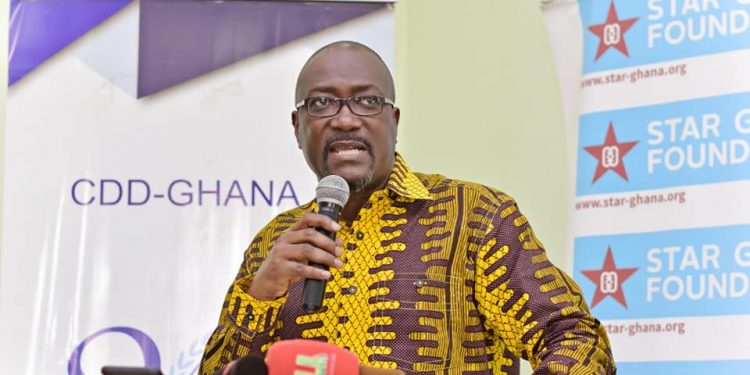Executive Director of the Centre for Democratic Development (CDD) Ghana says it’s about time the country explores other anti-corruption procedures as investments in prosecutions and prosecutorial bodies have not really paid off.
Professor Henry Kwasi Prempeh said Ghana’s over dependence on prosecutorial processes as a means of fighting corruption have not been satisfactory and thus has called for a review to include other anti-corruption procedures as well.
Speaking on JoyNews’ Newsfile Saturday, the Professor of Law said, “We have spent resources on prosecutorial bodies and various law enforcement agencies where the whole purpose of fighting corruption has been to detect it, investigate it, charge culprits if you can find them, gather evidence, launch prosecutions and hopefully get a conviction.
“If you look historically at the returns on that kind of investment certainly in Ghana, no one has to really tell you that we’ve had very little pay off from that approach to fighting corruption.”
His comment follows calls by the National Democratic Congress (NDC) and other Civil Society Organisations (CSOs) for investigations into the circumstances surrounding the controversial Agyapa deal and the prosecution of officials found culpable.
However, Professor H. K. Prempeh says prosecutions shouldn’t always be the case when fighting corruption.
He stated that the prosecutorial process does not take place within one organizational entity, “There are so many steps along the way not all of which is controlled by one entity, so who does the investigation, the detection often is different from the prosecutor who does the charging, the police, so there are many, many different entities along the line and of course, it ends in the judiciary.”
This, he said slows and sometimes impedes the fight against corruption as “at any one point somebody can drop the ball.”
He also stated that, the processes are somewhat politically mediated thus making it difficult for investigators and prosecutors to fully carry out their jobs without political interference and bottlenecks.
“So essentially we haven’t really had a good return on our investments from the approach to fighting corruption,” he said.
Thus he called on government to expand the number of tools in its anti-corruption tool kit – by including tools for the prevention of corruption.
According to him, inculcating a tool like the risk assessment tool will would entirely mitigate the occurrence of corruption by doing away with loopholes and opportunities in deals, law and even the constitution that may allow corrupt practices to fester.
He explained the risk assessment tool as, “It means that we don’t have to wait for the house to burn down before we put the fire extinguisher in it.”
He said, “When a deal is proposed or even when a piece of legislation or even a proposed constitution, it can be subjected to a corruption risk analysis because corruption though we think of it as a crime - that’s where the prosecutorial stuff comes in - it is also in a sense a crime of opportunity.
“If there are ample opportunities created within a deal, within legislation, within a particular kind of proposal for corruption to occur then the risk, the likelihood for corruption to occur is actually very high.
“So the idea here is that before you proceed with the project, before you proceed with the deal, before you proceed even with the law, you have an independent assessment of all the various ways in which corruption can enter into the deal.”
He added that when an independent assessment has been done of all the various loopholes in the deal, then a report can be drawn to show the way forward.
“So all the possible entry points, all the opportunities that are created in the deal for corruption to happen would then be looked at and then a proposal would be made as to how those loopholes may be mitigated or closed and a report then will form the basis upon which we will proceed or not proceed with the action.”
Latest Stories
-
Photos: Asantehene graces son’s graduation at DPS International
18 minutes -
Deputy Minister for Works and Housing visits Ecobank-JoyNews Habitat Fair Clinic
23 minutes -
Abdul Bashiru Hussein: The unseen spark lighting up Ghana’s football future
25 minutes -
2025 FIFA Club World Cup: Is European supremacy a myth?
34 minutes -
Brazil express interest in hosting 2029 FIFA Club World Cup
42 minutes -
TCL hosts West Africa Regional launch in Accra, showcasing innovation and strengthening partnerships
53 minutes -
Lecturer advocates mandatory teaching and military training for National Service Personnel
1 hour -
Hundreds of kids and coaches undergo Tennis training in Accra
1 hour -
‘We’ll always be available’ – Roger Smith commits to long-term support for Ghana Tennis
1 hour -
Ghana has enough fuel to last over 2 months – NPA Boss
1 hour -
2 dead, three injured in building collapse at Kotokuraba’s London Bridge area
2 hours -
‘It is exciting’ -Tennis star Katrina Adams poised for clinic in Ghana
2 hours -
Nigeria: Five die as bomb explosion rocks Kano
2 hours -
Volta’s decades of neglect must end – Council of State Member rallies MMDCEs to lead regional transformation
3 hours -
BoG justifies termination of a fraction of persons recruited in December 2024
3 hours

